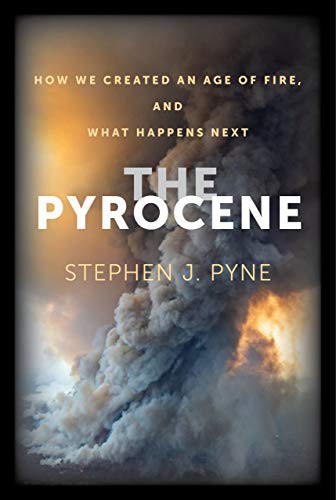Nibsy reviewed The Pyrocene by Stephen J. Pyne
The Pyrocene is a Symptom of the Anthropocene
4 stars
This book redefines a geological age, the Anthropocene, where humans have had such a profound influence over the natural world that their presence is recorded in geological strata all over the globe, to the Pyrocene, which began when people started using fire to serve their needs. As long as fuel was available on the landscape and oxygen was present in the atmosphere, the world has always known fire. Once humans came along, they learned how to control and manipulate fire to suit their needs. Because of fire's ability to integrate the complex relationships that shape ecological systems, humanity's use of fire began to reshape those systems. It opened up a greater variety of food available to people from cooking, and it allowed people to migrate into colder regions of the planet where they could use fires to keep warm. More recently, humans have learned to exploit fuels from past millennia in the form of fossil fuels to drive its industry, which transfers carbon from long ago from deep geological reservoirs into today's atmosphere causing a massive disruption in our climate. Just as the accumulation of ice pushed the Earth into an ice age (the Pleistocene), humanity's growing need for fire--particularly this latter type of fire--is pushing Earth into a fire age; the Pyrocene.
Part of the problem with this third type of fire (fossil fuel burning) is that it's being used to fuel equipment to suppress the first type of fire (natural fire). Natural fire is an important feature of terrestrial ecosystems. It clears out dead underbrush and liberates nutrients locked in dead biomass, providing access to sunlight and nutrients required for ecological and agricultural rejuvenation. When natural fires are suppressed, fuels accumulate such that when fire finally arrives it ravages instead of rejuvenates. We now tend to think about fire as a disturbance that requires human intervention, rather than a necessary ecological feature of natural systems.
Fire transmutes stubble and slash into accessible nutrients and typically stimulates nitrogen-fixing organisms. The alternative? Manure and artificial fertilizers. Fire can burn away the unwanted vegetation at least long enough to plant a year or two of crops. The alternative? Chemical herbicides and tractors. Fire sweeps away and smokes away, for a time, problem species. The alternative? Chemical pesticides. Fire does all this in a single process of flaming and smoldering. The alternative? There is none. In intensive cultivation, there is no desire to achieve all these outcomes, only those few that maximize production.
Science has finally come around to recognizing the value of fire, and the profoundly consequential effects of liberating fossil carbon into today's atmosphere. We are finally in the early days of a global transition that will reduce the quantity of greenhouse gasses that we release to the atmosphere. However, that transition does not consider how we can re-establish a healthy relationship with fire. As the pace of this global transition increases, we would be wise to consider fire as an ally instead of a foe, and make use of its powerful integrative capacity to help restore our damaged world.
Although the writing can be a bit saccharine at times, this book offers a unique perspective of past, present, and future fire and offers several insights into what we can do to use it to secure a sustainable future. Having said that, I'm not convinced that the concept of a Pyrocene usurps that of an Anthropocene inasmuch as it is complementary to it. Fire has always existed since plants invaded land. In the end, it was humans who dug up old coal, oil, and bitumen to transfer ancient carbon into future atmospheres. As the author argues convincingly, fire is a net force of good in the world, but its irresponsible use by humans has led to the ecological turmoil we face today. The agency of this ecological abuse rests squarely with humans, best captured by the Anthropocene (Greek "anthropo" = man) concept. What this author defines as the Pyrocene is but a symptom, albeit an important one, of the Anthropocene.

